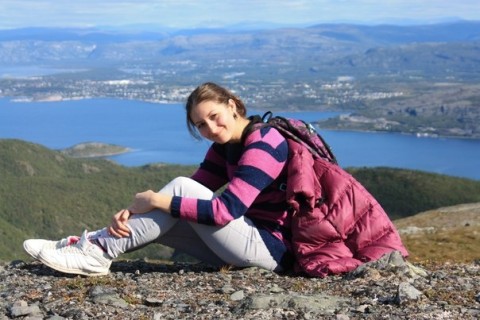- Ru
- En
- Fr
- Cn
Study in Norway through the eyes of USTU graduate
On December USTU graduate of "Public relations" Iolanthe Petrosyan came home after a long stay in Norway (Alta), where she was invited to finish the course of the "Undergraduate Circumpolar regional studies. Peoples and Cultures of the Circumpolar World "(short - BNS program).
Undergraduate of Northern Studies is an international program that is linked in the University of the Arctic with other universities, colleges, with networks for the northern academic and research institutions.
How did you know about the program?
- A group of teachers from Finnmark University College came to USTU to open the program.
How much time did you spend on online courses?
-Two and a half years.
Is it difficult to study on-line? What are the pros and cons of this method of teaching?
- It is simple to study online because everything can be done at your own pace and schedule. The advantage of the method is expansion of English language. The disadvantage is the difficulty of transition to studying entirely in English, because at home I could use a translator.
What are the living conditions in Norway for the students on this program?
- All visiting students live in dormitories. It is several blocks on three floors, which are divided into sections. One section is called the "gang" from 8 to 12 students live here, it depends on the unit. Each "gang" has its own kitchen. Each student has his own room, but the shower is for two. There are other hostels: next to the school, everything is near: there are entertainments, shopping, pool, or 10-15 minute walk from the school, where the other conditions, such as mountains and forest.
How did you meet with the teachers and students?
- On the first school day all international students met with teachers. Both told about themselves. In an informal atmosphere, we drank coffee and tea with traditional Norwegian waffles.
How was your study? What subjects did you choose to study?
- We were given schedule of classes at the beginning of the semester. Schedule for each week was different, the classes started at different times, but ended at the latest 15.30. I studied several required for graduation courses: international business, transnational strategy, project management, Norwegian, English phonetics and grammar.
What is the difference of study abroad and in Russia?
- The differences are very large. The main is in the approach to student learning. Another difference is in the relationship between teachers and students. You can always call the teacher if you have a question. There are free debates on the classes; much attention is paid to the group work. You can show personality and also make contact with other students. English teacher liked to sit on the desk, that did not make her lessons less informative, but the atmosphere became pleasant and conducive to conversation. The lessons reflect the principle of social life in Norway: individual opinion and the position of each person must be considered. But after the Russian university the lessons more like a meeting. They do not have an intense pace. The exams are very different. The exam is written for few hours in the presence of the Commission, and each of us finds assessment through the electronic system. This is to ensure that the training was a personal matter for each student.
How did you spend your weekend?
- In the first half of the semester, when the weather was warm, I spent a lot of time outdoors, went to other parts of the city, biked to the sea and climbed the mountains. Norwegian nature is amazing! Closer to winter we went to the bowling room, a swimming pool with sauna and outdoor Jacuzzi.
I know you went on excursions, tell us about them...
- There were o lot of excursions; they were constantly organized by students’ organization ESN - European biggest student organization. We went into the mountains, climbed to the top of Halden, visited Silver Gallery in the nearby Kautokeino town and went to the dam, which is located in the deepest canyon in Europe. The trip to the northernmost point of mainland Europe - North Cape was very interesting. We visited Husky farm, watched breed and care for breed of dogs. Sled dog race is a large and important event in Finnmark County.
What do you remember most on this trip?
- I remember everything! It is a wonderful experience. But the most memorable are people. They have a totally different approach to life.
You have completed the BNS. What did it give you?
- I changed my living position. After Norway many stereotypes and stiffness disappeared. I saw that in Russia society often has a depressing effect. And there it decided to exercise personal position and public opinion is not a contributing factor. Norway gave me the opportunity to understand what really brings me pleasure and a sense of fulfillment.
Victoria Litvinenko,
BNS Coordinator


